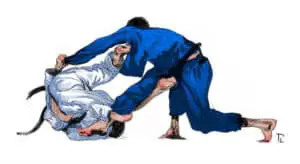You may have been training BJJ for a little while now and are curious about competing in your first BJJ competition. But are unsure how BJJ competitions work and how to best prepare for them. Don’t worry we will cover all the info you need to ensure you are well prepared for your first BJJ competition and are ready to take that gold medal.
How Long Should You Train BJJ Before Competing?
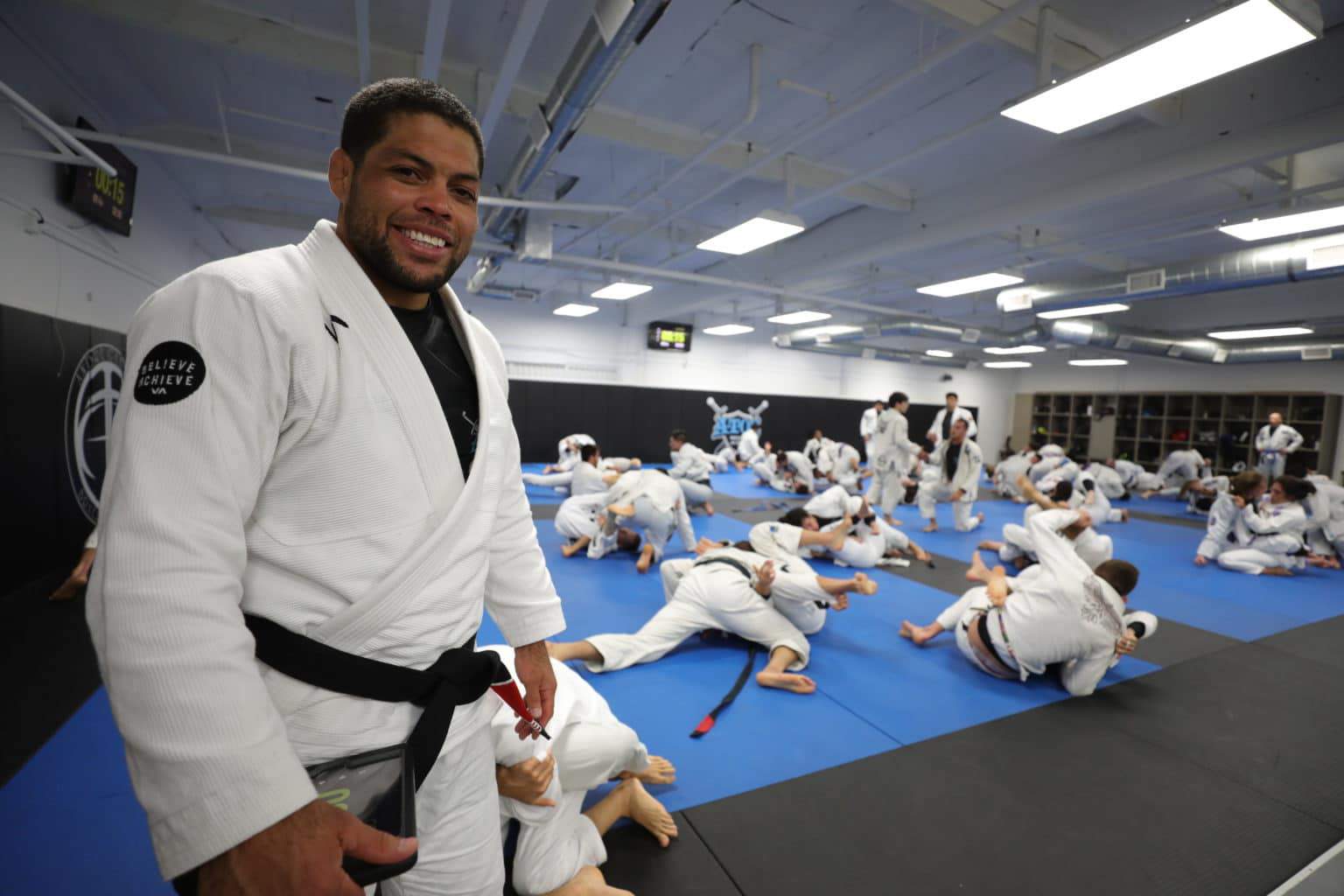
I recommend you train BJJ for at least 2 months before competing. BJJ is difficult to learn and if you compete too early you will not be able to perform the techniques in a high stress competition environment. Instead you will revert back to your instincts. It takes time to train your instincts to react to situations in BJJ with correct technique. I have seen it before where White Belts compete too early and their matches do not resemble BJJ but rather look like two people drunkenly wrestling each other, lots of enthusiasm but not much technique.
I recommend that you should compete once you have encoded the basic BJJ movements such as hip escape, bridge, a few submissions, guard retention and a few sweeps into your motor memory. This can be achieved after a few months of training. If you have a background in Judo or wrestling then you can compete at an earlier time I would just recommend you are familiar with the rules before your first competition. If you are unsure if you have trained enough for your first BJJ competition consult with your coach who will be able to tell if you are ready.
Should You Cut Weight For BJJ Competition?

If it is your first BJJ competition I don’t recommend you cut weight. Weight cutting is a miserable experience, it makes you feel grumpy and irritable. You want your first BJJ competition to be enjoyable and as easy as possible. Weight cutting just makes things more difficult. Weight cutting is also potentially dangerous and should only be undertaken under the supervision of someone who has significant experience helping athletes cut weight.
If you are a few pounds above a weight class and you can make the weight by simply eating and drinking a bit less one day or sweating a bit more at training then I think that is fine. However if you are more than 5 pounds away from the weight class below I recommend just competing at your natural weight. Weight cutting can give you a significant advantage in BJJ competitions as athletes dehydrate and then rehydrate resulting in them being much larger than the weight class limit during the match.
This increased size can make it easy to control and submit opponents. However the strenuous nature and the potential health risks of weight cutting make it not worth it for your first BJJ competition where the goal should be gaining experience and having fun. Once you gain more experience and start competing in bigger competitions you can consider incorporating weight cutting into your BJJ competition prep.
How To Train For BJJ Competition?
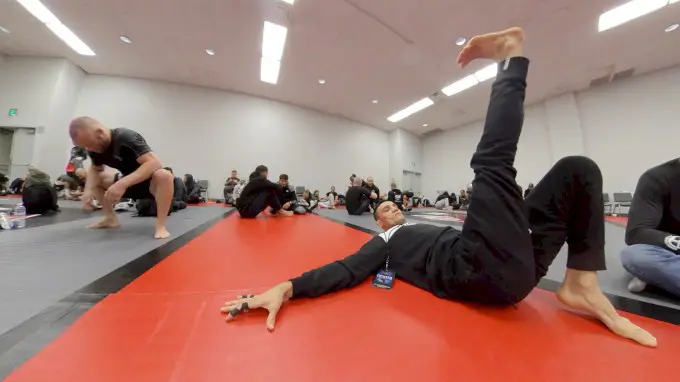
To train for a BJJ competition you should create an 8 week training plan. The first 2 weeks you should be ramping up your training volume and intensity, preparing your body and mind for hard training. The next 5 weeks you should be maintaining a high training volume and intensity with the goal of improving your conditioning and skill. In the final week you should taper and reduce your volume and intensity to let your body recover so you are ready to go on competition day.
Ideally you should be training 4-5 days a week of BJJ with 1-2 days of cardio. If you have only been training 2 times a week with no cardio don’t immediately increase your training volume to these prescribed levels. Instead use the first 2-3 weeks of your training plan to slowly increase your training volume. Once you reach these ideal training volumes you should strive to maintain them for 4-5 weeks.
You should follow your typical class training routine. If your gym offers competition classes which tend to be higher intensity then you should go to those. If your gym doesn’t don’t worry just make sure you are getting in at least 5 rounds of sparring each training session. It is also helpful to incorporate more situational sparring into your training to improve positions which you aren’t comfortable in. If you feel like your training isn’t intense enough ask your coach if they can help you train harder. They will be happy to accommodate.
What you choose to do for cardio is not important just as long as you do something and stick to it. Popular forms of cardio BJJ athletes utilise are sprints, kettlebells, skipping and swimming. The key is to find something you enjoy and that is challenging. I personally enjoy kettlebell workouts which can be done in 45-60mins and work your cardio while also helping you build muscle.
The week before your competition should be used as a taper week. During this week you should let your body and mind recover from the difficult training you have been undergoing. The first few days of the week you should reduce the length of your training sessions and reduce your number of sparring rounds to 2 or 3. 3 to 2 days before your competition you should stop all hard sparring, instead just do a few rounds of flow rolling per training session. The day before competition you should stop all physical activity and just focus on preparing your mind for competition. Make sure you get a good night’s sleep so you are ready to go for your BJJ competition.
What Should I Eat Before A BJJ Tournament?

In the weeks leading up to a BJJ tournament you should be eating a balanced healthy diet. You should continue eating foods which agree with you but remove the empty calories and junk such as fast food and soda. Instead focus on increasing your intake of fruit, vegetables and organic high quality meats. It is also very important to remain hydrated throughout the day including pre, during and post training.
You should regularly sip water throughout the day and monitor your urine colour to ensure it is a pale yellow colour indicating you are adequately hydrated.
Pre training you should eat at the latest 2 hours before training. I recommend eating fast acting carbs which are easy to digest and will help fuel your intense workout. Fruit such as bananas and mangoes are great fast acting carbs. Rice is also a great pre training fuel source.
Just make sure not to eat too much or too close to training as this can lead to stomach discomfort and nausea. It is best to avoid proteins and fats pre training as these can be difficult to digest and can leave you feeling bloated and tired.
During training you should not need to eat anything. Typically BJJ sessions don’t last for more than 2 hours. It is unlikely you will have burned enough calories during this period to require an intra workout meal. However BJJ does cause one to lose large amounts of fluid. It is important to stay hydrated throughout training. I regularly sipping water or a sports drink regularly throughout training.
Post training you should consume a high protein meal with an adequate amount of carbs. The protein will help your depleted muscles to recover and rebuild. While the carbs will refill your depleted glycogen stores ensuring you have the energy to train again tomorrow. A great post work out meal is a steak with rice and a salad.
If you are planning on reducing body fat in your BJJ competition prep then you should slowly reduce your calories. I recommend starting at a 250 calorie deficit and only slightly increasing this deficit once your body stops responding.
I do not recommend you try to gain weight in the lead up to a competition. Your body takes time to adapt to a heavier frame and you could end up feeling sluggish and slow. You should either eat to maintain your current weight or to slightly reduce your current weight by reducing excess body fat.
On the day of your BJJ competition you should not alter your diet. I have seen people radically change their diet on the day of competition and they end up feeling off and sometimes unwell. You should continue to eat foods that you know your body can digest and make you feel good.
A few hours before your competition eat your standard pre training meal and during your competition day continue drinking water and a sports drink to remain hydrated. If your matches are spread out across the whole day consider having a few snacks similar to your pre training meal. The main thing to remember is not to eat or drink too much and to stick to the same diet that you have been following in the weeks leading up to your BJJ competition.
How Long Should You Rest Before A BJJ Competition?
The week before a BJJ competition you should significantly decrease the intensity of your training. You should reduce the amount of hard sparring rounds you are doing and reduce the length of your training sessions. A few days before competition you should stop all hard sparring and instead focus on technical rolling.
The week before your BJJ competition should be used to prime your body and mind for competition. You need to allow your body to heal from the hard training so it is ready to perform on competition day. The day before competition I recommend you don’t train at all or if you feel like you need to do something just do a stretching and warm up routine. You need to rest to ensure you are full of energy for your competition matches.
How Do I Create A BJJ Game Plan For Competition?

If you fail to plan, then you should plan to fail. This saying couldn’t be more true for BJJ competitions. Too many people think they will turn up at their first BJJ competition and they will just react in the moment and all the techniques they have learned will magically come to them. Unfortunately if you are a beginner what will likely happen is the opposite. You will get nervous and forget that you have ever trained a day of BJJ in your life.
To avoid being a deer in headlights you need to come up with a game plan or a strategy for your first BJJ competition. To do this you need to come up with a list of your best techniques. You should write down your best 2 or 3 takedowns, sweeps, passes and submissions.
Once you have this list you should visualise yourself performing these movements in competitions. Visualise how you are going to set them up and how you are going to perform them. In training you should be specifically practicing these movements.
If you watch high level BJJ athletes most of them only use a few techniques in competition . They call this developing an A game which is what you will do. Once you have developed your A game come competition time you will be confident and ready to execute your game plan giving you a great shot at winning and taking home gold.
How Much Do BJJ Competitions Cost?
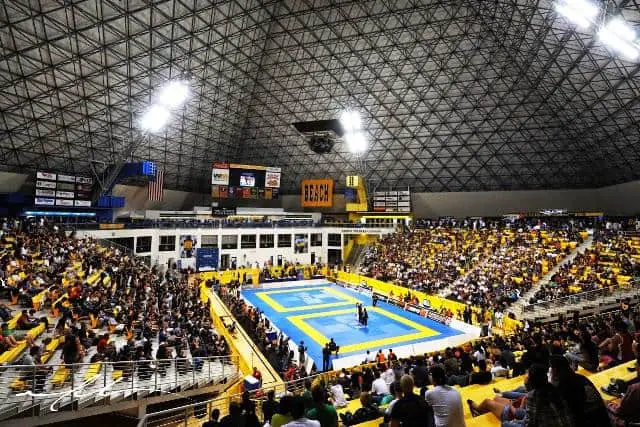
BJJ competitions typically cost between $50-$100, they are not cheap especially if you are coming from a wrestling or Judo back where prices are either free or 1/10th of BJJ competitions costs. The reason why BJJ competitions cost so much is they are run for profit with promoters banking quite a hefty sum every event they host.
Often you will have to pay per division you enter for example there will be separate fees for competing in gi and no-gi and for competing in your weight class and the absolute division.
If you are young and have dreams of competing at a high level but don’t have the cash to compete. Don’t worry gyms and BJJ companies will often sponsor young talented kids, by paying for their entry fees. So keep training hard and stay dedicated and it is likely that a sponsor may help you out with your BJJ competition costs.
Also quite a few competitions in a bid to attract high level competitors will invite Black and Brown Belts to compete for free. And then once you start competing at a high level you will be able to compete for cash prizes which can be pretty juicy.
How Much Do BJJ Competitors Make?
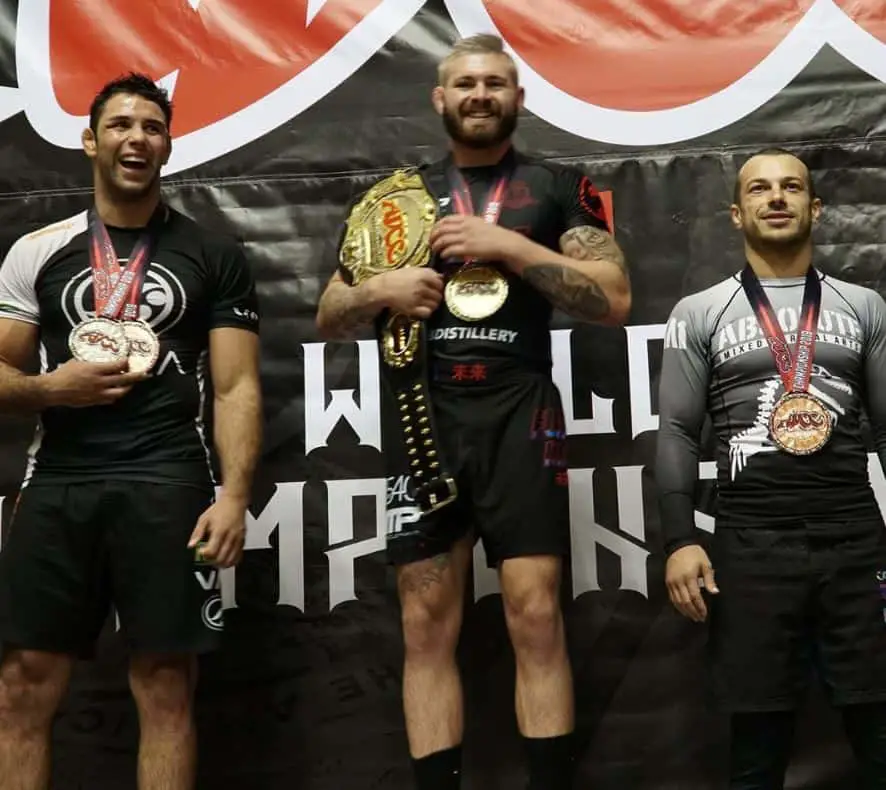
There are more and more BJJ competitions offering cash prizes but the amount of money BJJ competitors make directly from competitions is still small. ADCC which is held every 2 years is the richest BJJ competition. In 2019 they offered $10,0000 to every weight class winner and $40,000 to the absolute division winner. The biggest BJJ tournament in the world, the IBJJF World Championships pays Black Belt division winners between $4000 and $7000 depending on the size of the divisions they win. The UAE JJ pays Black Belt winners $2500 per tour competition which they regularly hold throughout the world.
Even though BJJ competitors don’t make anywhere near the money that other professional athletes make from competition they still can earn large amounts of money through running an academy, teaching seminars, sponsorship deals and releasing instructional content.
By developing a name through competitions many BJJ athletes open academies attracting hundreds of students each paying on average $150-$200, you can quickly see how BJJ competitors can make a lot of money teaching students. High level BJJ athletes will often travel the country and world teaching seminars at different BJJ academies, they often charge thousands of dollars per seminar which can add up quickly if you are teaching a seminar a week. BJJ competitors can make lots of money selling online instructionals which often are priced at between $50-$200 by selling a few thousand copies.
BJJ athletes can be raking in the dough. Gordon Ryan, one of the most successful BJJ competitors who has won major tournament prizes, regularly teaches seminars and has successfully released online training instructionals is making high six figures a year from BJJ.
How Often Should You Compete In BJJ?
Now you have caught the BJJ competition bug and are ready to train and compete as much as possible but how often should you. How often you compete in BJJ depends on your goals, your time, finances and your body. If you are healthy and have all the time in the world and you have dreams of becoming a BJJ world champion then you should compete as much as possible. Wrestlers will often have 50+ matches a year. So if you have goals of competing at a high level I would recommend you compete once a month and then depending on how your body reacts either increase or decrease this amount.
If you are a hobbyist who wants to get the most out of competing in BJJ then I recommend competing around 4 times a year this allows you to prepare thoroughly for your competitions while giving your body and your wallet time to heal between competitions. If you are just competing for fun then compete as much or as little as you like but listen to your body to ensure you don’t increase the chances of you getting injured.
If you follow the plan outlined in this BJJ competition guide your first BJJ competition will be a great success. I wish you all the best in your first BJJ competition and hope you keep competing for many years to come.
